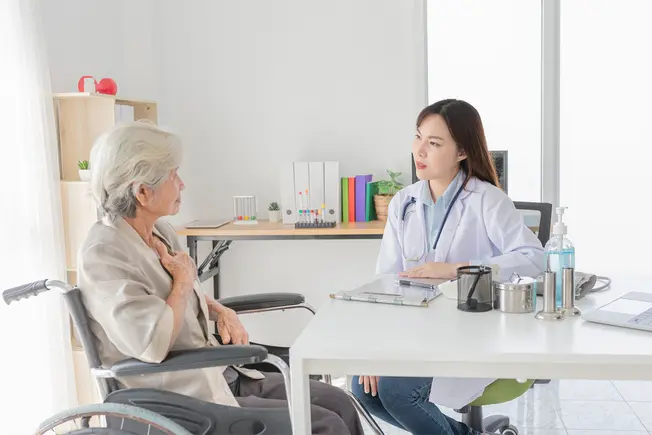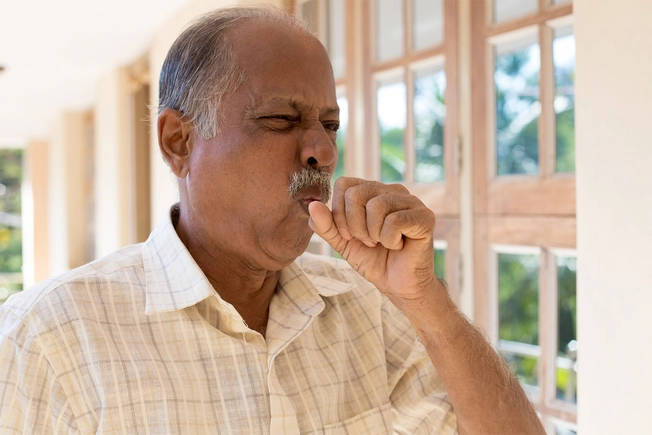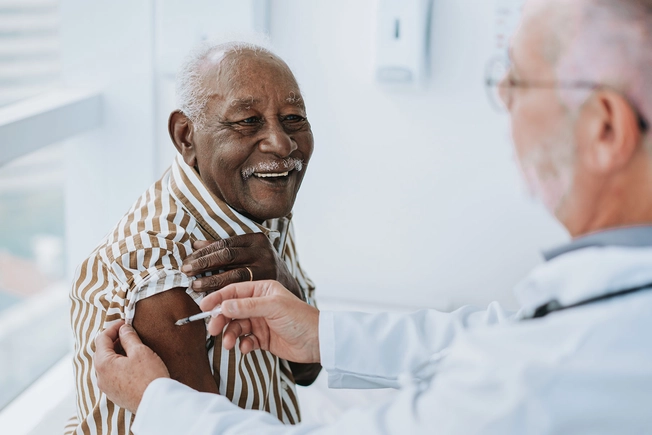Older Adults and RSV


Understanding RSV in Older Adults
Respiratory syncytial virus (RSV) isn't just a concern for children—it can be serious for older adults too. As we age, our immune systems may weaken, making us more susceptible to severe RSV infections. This virus can lead to pneumonia or worsen existing conditions like asthma or COPD. Fortunately, vaccines are available to help protect older adults.

Recognizing RSV Symptoms in Seniors
RSV in older adults can be tricky to spot, as symptoms often mimic other respiratory illnesses. Watch for signs like persistent cough, wheezing, rapid or difficult breathing, and fever. You might also notice fatigue, decreased appetite, or confusion. If you or a loved one experience these symptoms, especially during RSV season (typically fall through spring), contact your health care provider. Early detection can help prevent complications.

The Impact of RSV on Older Adults
For seniors, RSV isn't just a bad cold — it can be life-threatening. Up to 160,000 older adults are hospitalized in the U.S. each year due to RSV, and as many as 10,000 die due to complications. The virus can exacerbate existing health issues and lead to severe breathing problems. Studies have found that the likelihood people need medical treatment for RSV increases with age and is highest among those ages 70 and older.

Who Should Get the RSV Vaccine
The CDC recommends that everyone ages 75 and older get the RSV vaccine. People ages 60 to 74 who are at increased risk for severe disease due to RSV should also get vaccinated. You may be considered at risk for severe RSV if you have one of 11 risk factors, including heart disease, living in a nursing home, frailty, or severe obesity. Even if you don't have one of the risk factors, your health care provider may determine you are high risk.

How the RSV Vaccines Work
The new RSV vaccines work by stimulating your immune system to produce antibodies against the virus. When you're exposed to RSV after vaccination, your body is better prepared to fight it off. The vaccines target a specific protein on the surface of the RSV virus, helping your immune system recognize and combat it more effectively. A large study in The Lancet found that the vaccine is 80% effective at preventing hospitalization due to complications from RSV and similarly effective at protecting older people from death.

Potential Side Effects and Considerations
Like all vaccines, RSV vaccines can have side effects, though most are mild and short-lived. Common reactions include pain at the injection site, fatigue, muscle pain, and headache. More serious side effects are rare but can include allergic reactions and Guillain-Barré syndrome, a disorder in which your immune system suddenly attacks your nerves.

Combining the RSV Vaccine With Other Immunizations
You can get the RSV vaccine at the same time as other vaccines, including the flu shot and COVID-19 boosters. This can make it more convenient to stay up to date on all your immunizations. However, let your health care provider know about all recent or planned vaccinations to avoid any potential interactions. Your provider can help create a vaccination schedule that works best for you.

Beyond Vaccination: Additional RSV Prevention Tips
While the new vaccines offer significant protection, they're just one part of a comprehensive approach to RSV prevention. Continue practicing good hygiene, such as frequent handwashing and avoiding close contact with sick people. Keep your living space clean and well-ventilated. Stay healthy by eating a balanced diet, getting regular exercise, and managing any chronic health conditions.
Photo Credits:
1) Akkalak Aiempradit/Shutterstock
2) AshTproductions/Shutterstock
3) Getty Images
4) Shutterstock
5) Getty Images
6) Shutterstock
7) Gorodenkoff/Shutterstock
8) Maridav/Shutterstock
SOURCES:
https://www.webmd.com/vaccines/news/20240807/cdc-revises-rsv-vaccine-guidelines-over-side-effect-concerns
https://www.webmd.com/vaccines/news/20241018/rsv-vaccine-shows-strong-protection-for-older-adults
William Schaffner, MD, spokesperson and former medical director, National Foundation for Infectious Diseases.
CDC: “RSV in Older Adults and Adults with Chronic Medical Conditions,” “Respiratory Syncytial Virus.”
National Foundation for Infectious Diseases: “Facts about Respiratory Syncytial Virus.”
American Lung Association; “RSV Treatment and Prevention.”
MedlinePlus: “Respiratory Syncytial Virus,” “Respiratory Syncytial Tests.”
Norton Healthcare: “RSV Can Be Deadly in Adults Age 65+.”
Clinical Microbiology Reviews: “Respiratory Syncytial Virus Infection in Adults.”
UpToDate: “Respiratory syncytial virus infection: Treatment.”
Pfizer: “Pfizer Announces Positive Top-Line Data from Phase 3 Trial of Older Adults for its Bivalent Respiratory Syncytial Virus (RSV) Vaccine Candidate.”
American Medical Association: “RSV vaccines: Questions patients may have and how to answer.”
Mayo Clinic: “Guillain-Barre syndrome.”
CDC: “Frequently Asked Questions About RSV Vaccine for Adults,” “Respiratory Syncytial Virus Infection (RSV),” “RSV Vaccination for Older Adults 60 Years of Age and Over,” “RSV Transmission,” “Symptoms and Care.”
Columbia University: “Everything You Need to Know About the RSV Vaccine.”
Cleveland Clinic: “Why Is RSV Different Now Than In Past Years?”